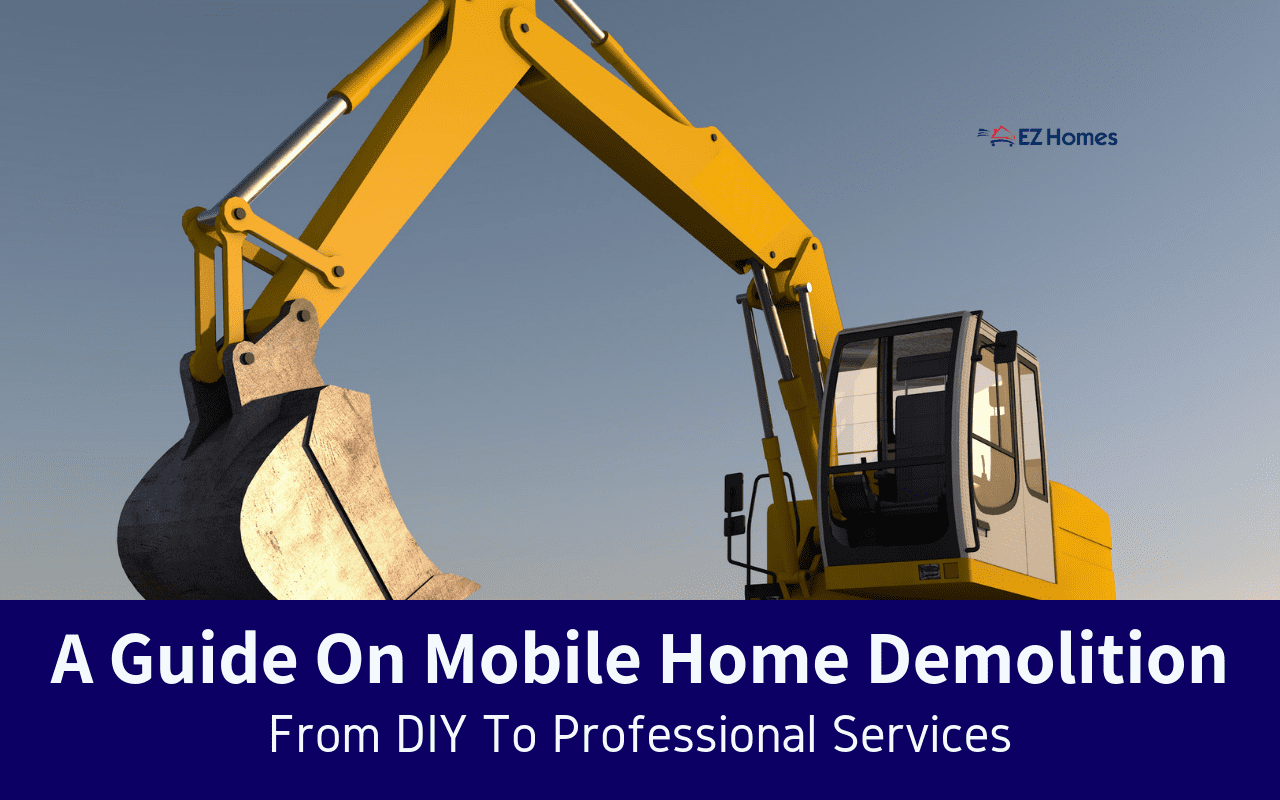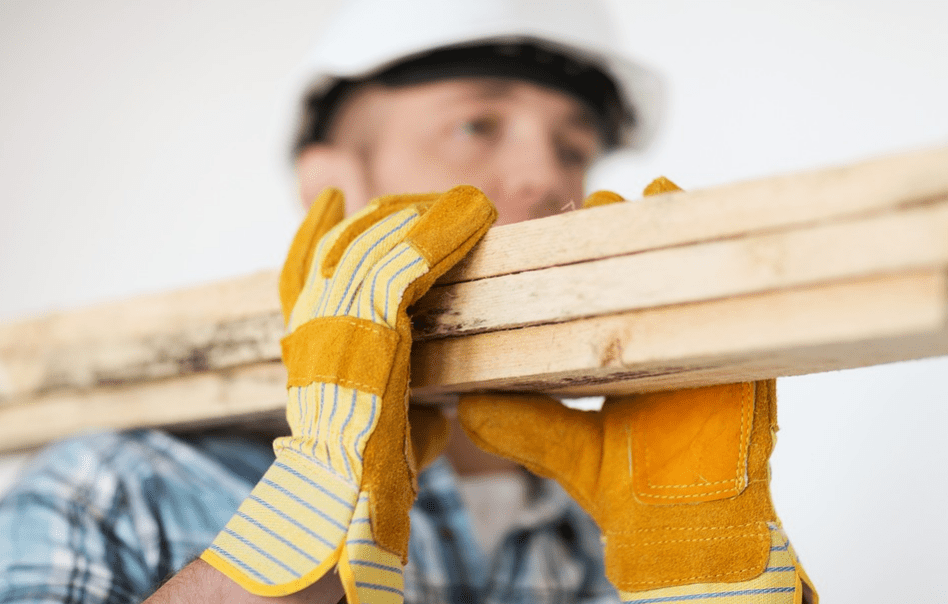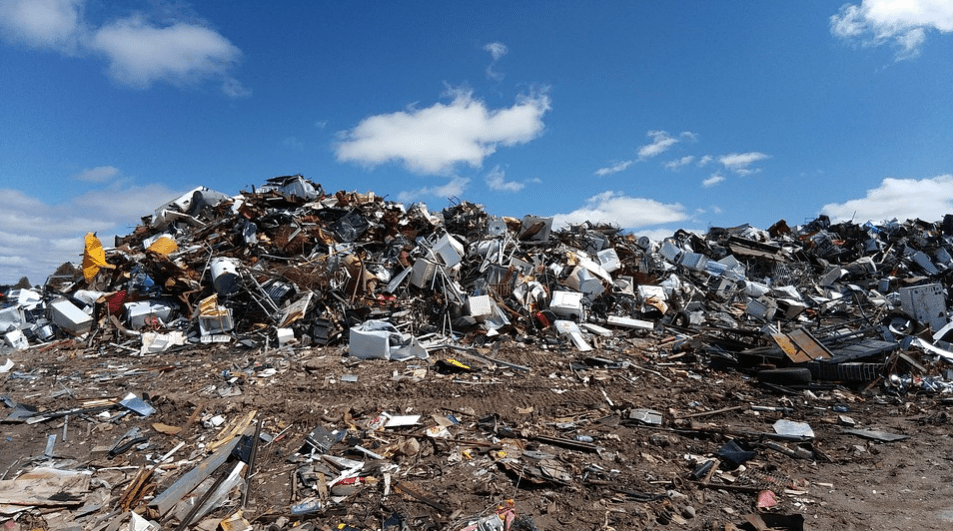Choosing to dispose of a mobile home can be a difficult decision to make. Just the idea can cause homeowners and park managers to panic. But it doesn’t have to be this way. You can choose between a range of options for mobile home demolition to find one that suits you.

The two main options are doing it yourself or hiring a professional service to help you. There are advantages and disadvantages to both. So, to help you make your decision let’s look at both options in more detail.
Does it need to be demolished?
Care and maintenance can help to prolong the lifetime of your manufactured home. But unfortunately, like most things in life, mobile homes don’t last forever. There comes the point where you need to dispose of the house. It might no longer be safe or up to standard.
Here are some signs that it might be time to let go:
- The home has been used longer than its predicted lifetime. Usually, the life expectancy for modern structures is 30 to 55 years. By this time the condition of the house can become a cause for concern.
- If the home needs extensive repairs you should consider disposing of it. Replacement of plumbing or work on the foundation could be costly. The cost might not be worth it. It might just be time to invest in a new house.
- You have doubts whether it is still structurally sound. Signs of potentially significant issues are a sagging roof, walls that seem to have shifted, and doors that no longer close tightly.
You can have your home inspected to check whether it is still safe and in a liveable condition. This should be the first step if you think you need to dispose of the house.
Take a look at this article for more information on the life expectancy of different types of mobile homes.
What does DIY mobile home demolition involve?
Once you have decided that it is time to get rid of the structure you need to decide on the best way to do this. Many mobile home owners are curious whether they can break down the house on their own.
Performing the demolition on your own is possible. But it is recommended that you have some experience in construction. It can be a challenging process, and some knowledge and skill will be beneficial. Either way, you will probably need to do some research beforehand.
Before you make a choice, take a look at the advantages and disadvantages of a DIY demolition.
Pros and cons of DIY demolition
Pros:
- You can save some money on labor costs by doing it yourself. Get some friends to help, and you will be able to cut even more expenses.
- The entire process will be in your hands. You can decide exactly how to do it and when to do it.
- It can be great fun if you enjoy DIY projects and are very handy.
- Ask anyone who has completed a project on their own, and they will tell you about the unique feeling of satisfaction that it gives you.
- It can be easier to salvage any material that you want, like metals to be recycled.
Cons:
- You will need to hire or buy all the equipment you need for the demolition and clean up. You also need to get safety gear for everyone who will be helping you.
- Deconstruction requires effort and hard work. If you aren’t strong or physically fit it can be challenging to perform all this labor on your own.
- You will probably need help. If you don’t have family or friends that can help it means that you might need to hire workers to aid you.
- To do it yourself you should research the process thoroughly. It will be beneficial if you have some knowledge on how mobile homes are constructed.
- The responsibility of getting a permit will fall solely onto you.
- Some people will find it stressful to handle everything yourself. Every small detail will be in your hands.
- You need time. If you aren’t as practiced and experienced the demolition can take longer than you expect.
Steps to DIY demolition
The DIY process can be divided into three main parts: preparation, destruction, and taking care of the debris.

The following is a short summary of the steps of a DIY home demolition:
1. Get a permit
You need to obtain a permit to be able to deconstruct the home legally. You will need to contact your local government and provide them with the necessary paperwork and information. Depending on your area, the permit can cost between $100-$350.
2. Have your home inspected
Part of the preparation is to hire an abatement contractor to take a look at your home. You need to make sure that the structure doesn’t contain any asbestos. If it does, it needs to be removed before you can continue.
3. Formulate a plan of action
The best way to proceed is to plan out the whole process. Consider every step of the process. Safety should be a key consideration in this process. And careful planning will help you to avoid hiccups along the way.
4. Cut off the utilities
The next step is to disconnect all the utilities. You need to cut off any that are connected to the old mobile home from telephone lines to your electricity.
5. Strip the home
Now you can begin the actual demolition. You need to strip all the fittings from the interior of the home. This includes removing all the insulation, windows, and doors. After this, you can break down the walls into smaller sections and detach the floor from the frame.
6. Dispose of the debris
The last step is to get rid of the rubble. You can salvage the metal from the structure. The rest of the debris should be placed into dumpsters and disposed of.
What does professional mobile home demolition involve?
One of the most popular options for mobile home demolition is to hire a professional to take care of the job. Many owners feel more comfortable with this and believe that it is the safer and less stressful course of action. This will probably be the case for homeowners who have no construction or deconstruction experience.
However, hiring a professional can be expensive. That is why it is essential to do your research first. Despite what people think, hiring a great contractor can save you money while hiring cheaply might be more expensive in the end.

Any mistakes in construction or demolition can cost you dearly. You might have to pay more money than expected to rectify it. Not to mention the extra stress that this may lead to.
You should be able to find many contractors in your area that will be able to assist you.
Pros and cons of professional demolition
Pros:
- One clear benefit of hiring a contractor is that you and your family won’t need to do all the hard work yourself.
- Most contracts will handle all the paperwork and will take care of obtaining the demolition permit.
- Letting professionals handle it can be less stressful. You can rest a bit easier knowing that an experienced hand is taking care of everything.
- It could take far less time. A professional will have more people to help and will have practiced the process.
- They might be able to help you avoid hiccups that will lead to more time and expenses.
- A professional company will own their own demolition, cleaning, and safety equipment or gear.
In summary, if you hire a good contractor, the process can require less effort and be less trying.
Cons:
- Depending on who you hire, a professional service can be quite expensive. Labor costs and tax will be added to the costs of equipment, removal and so forth.
- You will have less control over the process.
- It can be challenging to find a credible contractor who will do everything you want them to.
- You will have to be able to place your trust in the company.
Steps to professional demolition:
1. Research local contractors
The first step should be to look up local contractors. There will be listings available in most areas of the United States. Generally, it is a good idea to make a list of the most promising ones.
2. Ask all the right questions
Don’t be too hasty about making a decision. Go through the list of contractors and try to see which would be suitable. We recommend that you choose three or so to follow up on. Before you hire one, there are several questions that you need to ask. For example, you should ask what their cost estimate is, how their safety record looks, and about the process that they follow.
3. Decide on a credible contractor
After this, you should be able to choose the best professional for your needs. You will probably be more comfortable if you are able to meet them before hiring. Make sure that the contractor you want to hire has a business license.
4. Check that he has followed the legal protocol
Even if you have hired a professional contractor to handle all the hard work the demolition is still mainly your responsibility. Try to keep your eye out throughout the process to make sure that everything is in order. Check that they have submitted all the necessary paperwork and have obtained a permit.
5. Disposal of debris
A professional contractor will most likely take care of the removal and disposal of the rubble. However, you shouldn’t take this for granted. You need to ask your contractor about this beforehand and check up afterward that it has been done to your satisfaction.

If you want to salvage some of the metal or other material from the wreckage you should let the contractor know.
The third option: removing the home
Even though profession or do-it-yourself demolition are the paths that most readily come to mind, they aren’t the only ones. There are other alternatives to dealing with an old mobile home that has seen better days.
Another option is to have the house hauled away. You could find a company or hire a flatbed yourself to take the structure to a scrapyard.
This might sound like a relatively simple choice. There is usually less mess and less fuss involved. However, it isn’t always an option.
One possible obstacle is that the house is no longer roadworthy. This means that it is no longer safe to tow away the structure on a trailer or truck. It might break or fall apart along the way. An inspector will be able to tell you if it has deteriorated too much. You need to get a permit that states that it is still roadworthy.
A second possible obstacle is that you won’t find the necessary services in your area. There might not be a scrap yard or dump that is willing to take an entire mobile home.
Even if these obstacles aren’t an issue, it won’t be cheap. You usually need to use the services of a company that specializes in transporting mobile homes. Besides this, some measure of deconstruction is still necessary. You still need to strip fittings and so on from the interior and exterior of the house.
Going forward
As you can see, there are several options you can choose from, from hiring professional services to doing everything yourself. Which one you decide on should depend on what is most important to you.
Whichever way you choose to go, research and attention to detail can help to make the entire procedure flow more smoothly.
To help you, our blog has tips, guides, and steps on how to deal with old and damaged mobile homes. The following would be a good place to start:
- Disposing Of Old Mobile Homes Safely, Legally, And As Easily As Possible
- Mobile Home Salvage: How It Works And What You Need To Know
Hopefully, reading this guide will help you to make the best decision for you on what to do about mobile home demolition.


